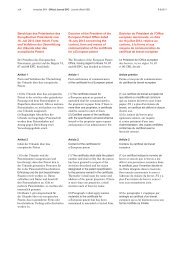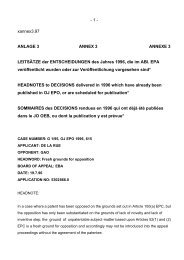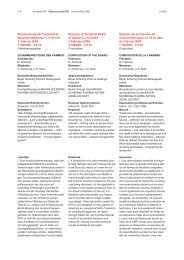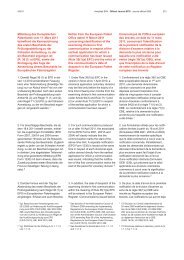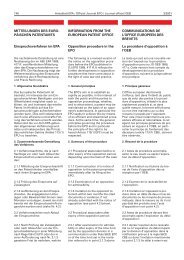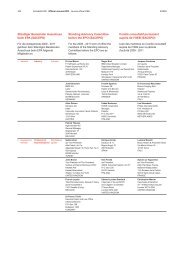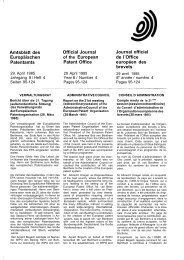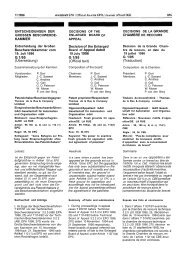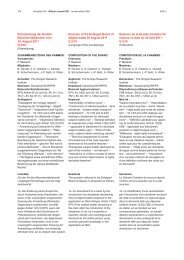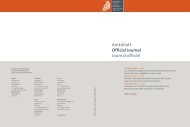Entscheidung der Großen Beschwerdekammer vom 23. Juli 2012 G ...
Entscheidung der Großen Beschwerdekammer vom 23. Juli 2012 G ...
Entscheidung der Großen Beschwerdekammer vom 23. Juli 2012 G ...
You also want an ePaper? Increase the reach of your titles
YUMPU automatically turns print PDFs into web optimized ePapers that Google loves.
4/2013 Amtsblatt EPA Official Journal EPO Journal officiel OEB 203<br />
res Rechtsmittel zur Verfügung, um das<br />
Patent anzufechten, was beson<strong>der</strong>s<br />
dann unvertretbar sei, wenn <strong>der</strong> anhängige<br />
Einspruch infolge <strong>der</strong> Berichtigung<br />
zurückgewiesen werde. Lege ein Einsprechen<strong>der</strong><br />
dann Beschwerde ein, so<br />
könne er nicht die Berichtigung als solche<br />
anfechten, die aber <strong>der</strong> eigentliche<br />
Grund für die Zurückweisung seines<br />
Einspruchs war. Ebenso wenig gebe es<br />
eine Vorschrift zur Rückzahlung o<strong>der</strong><br />
Erstattung <strong>der</strong> Einspruchsgebühr.<br />
Fünftens werde <strong>der</strong> Grundsatz <strong>der</strong><br />
Gleichbehandlung <strong>der</strong> am Einspruchsverfahren<br />
Beteiligten infrage gestellt,<br />
da ein Patentinhaber ein mehrseitiges in<br />
ein einseitiges Verfahren umwandeln<br />
könnte, in dem dann über eine für das<br />
Einspruchsverfahren maßgebliche Frage<br />
entschieden werde, nämlich über den<br />
Inhalt des Patents.<br />
VIII. Auf eine Auffor<strong>der</strong>ung <strong>der</strong> <strong>Großen</strong><br />
<strong>Beschwerdekammer</strong> nach Artikel 10 (2)<br />
VOGBK (s. ABl. EPA 2010, 402) an<br />
Dritte, Stellungnahmen einzureichen,<br />
gingen zwei Amicus-curiae-Schriftsätze<br />
ein. Der erste stammte <strong>vom</strong> Institut <strong>der</strong><br />
beim EPA zugelassenen Vertreter (epi).<br />
Nach dessen Ansicht seien die <strong>der</strong><br />
<strong>Großen</strong> <strong>Beschwerdekammer</strong> vorgelegten<br />
Rechtsfragen zu bejahen. Ein Antrag<br />
nach Regel 140 EPÜ sollte je<strong>der</strong>zeit<br />
zulässig sein, auch noch nach Einleitung<br />
des Einspruchsverfahrens, nur die Prüfungsabteilung<br />
sollte befugt sein, über<br />
diese Anträge zu entscheiden, und eine<br />
Überprüfung dieser <strong>Entscheidung</strong> durch<br />
die Einspruchsabteilung sollte ausgeschlossen<br />
sein, und zwar aus folgenden<br />
Gründen:<br />
1. Regel 140 EPÜ diene <strong>der</strong> Berichtigung<br />
von Fehlern in <strong>Entscheidung</strong>en<br />
des EPA, nicht in <strong>vom</strong> Patentanmel<strong>der</strong><br />
o<strong>der</strong> -inhaber eingereichten Unterlagen,<br />
und die hierfür geltenden Maßstäbe<br />
sollten streng sein. Angesichts <strong>der</strong> Art<br />
<strong>der</strong> möglichen Berichtigungen enthalte<br />
Regel 140 EPÜ zu Recht keine Frist.<br />
2. Die Einspruchsabteilung dürfe nicht<br />
zu einer Überprüfung <strong>der</strong> <strong>Entscheidung</strong><br />
<strong>der</strong> Prüfungsabteilung befugt sein, da<br />
ansonsten <strong>der</strong> Ausgangspunkt für<br />
die Analyse nach Artikel 123 (3) EPÜ<br />
unsicher sei.<br />
the pending opposition is rejected as a<br />
result of the correction. If an opponent<br />
then appeals, he cannot challenge the<br />
correction itself, which however was the<br />
real reason for rejecting his opposition;<br />
nor is there any provision for the refund<br />
or reimbursement of the opposition fee.<br />
Fifth, the principle of equal treatment<br />
of parties in opposition proceedings is<br />
questioned since a patent owner has the<br />
possibility to turn inter partes proceedings<br />
into ex parte proceedings which<br />
decide an issue – the content of the<br />
patent – which is decisive for the<br />
opposition proceedings.<br />
VIII. In response to an invitation (see<br />
OJ EPO 2010, 402) to third parties<br />
to file statements in accordance with<br />
Article 10(2) RPEBA, the Enlarged<br />
Board received two amicus curiae briefs.<br />
The first was filed by the Institute of<br />
Professional Representatives before the<br />
EPO ("epi"). In its opinion the questions<br />
referred to the Enlarged Board of Appeal<br />
should be answered in the affirmative –<br />
a request un<strong>der</strong> Rule 140 EPC should<br />
be admissible at any time, including<br />
after the commencement of opposition<br />
proceedings; and only the examining<br />
division should be competent to decide<br />
such requests and the opposition division<br />
should be precluded from reviewing<br />
that decision. The reasons for those<br />
responses were as follows.<br />
1. Rule 140 EPC is intended for<br />
correcting errors in decisions of the<br />
EPO and not errors in documents filed<br />
by a patent applicant or proprietor and<br />
the conditions to be applied should be<br />
strict. It is right that Rule 140 EPC<br />
contains no time limit in view of the<br />
character of the possible corrections.<br />
2. The opposition division must be<br />
precluded from reviewing the decision<br />
of the examining division since otherwise<br />
the starting point for an analysis un<strong>der</strong><br />
Article 123(3) EPC would be ren<strong>der</strong>ed<br />
uncertain.<br />
ils ne disposent également d'aucun<br />
moyen supplémentaire pour attaquer le<br />
brevet, ce qui constitue une situation<br />
particulièrement intenable si l'opposition<br />
en instance est rejetée en conséquence<br />
de la rectification. Si un opposant forme<br />
ensuite un recours, il ne peut contester<br />
la rectification proprement dite, alors que<br />
celle-ci a été le véritable motif de rejet de<br />
l'opposition ; de même, il n'existe aucune<br />
disposition prévoyant le remboursement<br />
de la taxe d'opposition.<br />
Cinquièmement, le principe de l'égalité<br />
de traitement des parties à une procédure<br />
d'opposition est mis en cause<br />
puisque le titulaire d'un brevet a la possibilité<br />
de transformer une procédure inter<br />
partes en procédure ex parte, laquelle<br />
tranche une question, en l'occurrence le<br />
contenu du brevet, qui est décisive pour<br />
la procédure d'opposition.<br />
VIII. Après avoir invité les tiers à présenter<br />
des observations conformément à<br />
l'article 10(2) RPGCR (cf. JO OEB 2010,<br />
402), la Grande Chambre de recours<br />
a reçu deux prises de position. La<br />
première provenait de l'Institut des<br />
mandataires agréés près l'OEB ("epi").<br />
Selon l'epi, il y a lieu de répondre par<br />
l'affirmative aux questions soumises<br />
à la Grande Chambre de recours. Une<br />
requête au titre de la règle 140 CBE doit<br />
être recevable à tout moment, y compris<br />
après le début d'une procédure d'opposition<br />
; de plus, seule la division d'examen<br />
devrait avoir compétence pour statuer<br />
sur ce type de requêtes et la division<br />
d'opposition ne devrait pas pouvoir<br />
réexaminer cette décision, et ce pour<br />
les raisons suivantes :<br />
1. La règle 140 CBE permet de rectifier<br />
des erreurs dans les décisions de l'OEB,<br />
et non des erreurs contenues dans les<br />
pièces produites par un demandeur ou<br />
titulaire de brevet, et les conditions à<br />
appliquer devraient être strictes. La<br />
nature des rectifications susceptibles<br />
d'être apportées justifie l'absence de<br />
délai à la règle 140 CBE.<br />
2. La division d'opposition ne doit pas<br />
être autorisée à réexaminer la décision<br />
de la division d'examen puisque, dans<br />
le cas contraire, cela créerait une incertitude<br />
quant au point de départ à partir<br />
duquel il peut être procédé à une<br />
analyse aux fins de l'article 123(3) CBE.



